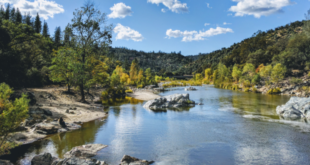The State Water Resources Control Board’s Site Cleanup Subaccount Program (SCAP) has issued a $4.6 million grant to the Lahontan Regional Water Quality Control Board to investigate regional perchloroethylene (PCE) groundwater contamination in South Lake Tahoe. The colorless liquid chlorocarbon has affected or is threatening to impact multiple drinking water supply wells, including those operated by three different water suppliers.
However, the Lahontan Water Board has indicated that South Lake Tahoe water purveyors are continuing to provide a safe water supply for South Lake Tahoe residents, businesses, and visitors.
PCE is a colorless liquid that can be harmful when ingested, inhaled or touched. Short-term exposure can cause acute effects, such as dizziness, headaches, and nausea, among other things, while prolonged exposure is known to be a cause of cancer and neurological problems.
PCE has been detected in groundwater in the South Y area at concentrations as high as approximately 1,700 parts per billion (ppb) and in individual supply wells as high as approximately 60 ppb. The drinking water maximum contaminant level for PCE is 5 ppb. Any water supply wells with detections exceeding 5 ppb PCE were shut down to ensure customers continue receiving safe drinking water.
PCE is a common ingredient in many dry-cleaning and metal degreasing products. The investigation into PCE’s presence in South Lake Tahoe will focus on the “South Y area” of South Lake Tahoe in El Dorado County, an area generally surrounding the intersection of Highways 50 and 89 and extending in area north and northeasterly of the South Y. Several businesses in the South Y area are known or suspected to have used, stored, or disposed of PCE or PCE-containing products.
The Lahontan Water Board issued a Cleanup and Abatement Order (CAO) in 2017, requiring multiple responsible parties to investigate and cleanup the full lateral and vertical extent of PCE contamination originating from a property in the South Y area that formerly operated a dry-cleaning facility. There have been multiple other investigations that have occurred over the years in the South Y area but the investigations have been site-specific or localized investigations. They have lacked the opportunity to fully evaluate the full extent of the regional PCE contamination. However, the new SCAP grant funds will allow the Lahontan Water Board to thoroughly investigate sources of surface water and groundwater contamination.
“This will be the first comprehensive regional investigation of the South Y area PCE contamination and should provide valuable information allowing the Lahontan Water Board, water suppliers, and other parties to better address the contamination through water treatment and cleanup,” said Patty Kouyoumdjian, executive officer for the Lahontan Regional Water Board. “We are pleased to lead this effort and are looking forward to a very productive investigation.”
SCAP funds were established by Senate Bill 445 (authored by Sen. Jerry Hill, CA Senate District 13, 2014) authorizing grants for projects to investigate sources of surface water and groundwater contamination as well as remediating the harm to human health, safety and the environment caused by existing or threatened surface or groundwater contamination. The Lahontan Water Board will oversee implementation of the grant-funded work including coordinating with any contractors for the project oversee implementation of the grant-funded work, which is expected to begin in early summer 2019.
“While Lake Tahoe’s beauty and clarity remains a worldwide attraction, our drinking water supplies are at risk of further contamination unless prompt action is taken,” said Kouyoumdjian. “This grant gives us the critical funds to fully investigate the regional PCE groundwater contamination, track down all potential sources of pollution, expedite cleanup and protect our remaining drinking water sources.”
 California Water News Daily Your Source For Water News in California
California Water News Daily Your Source For Water News in California


